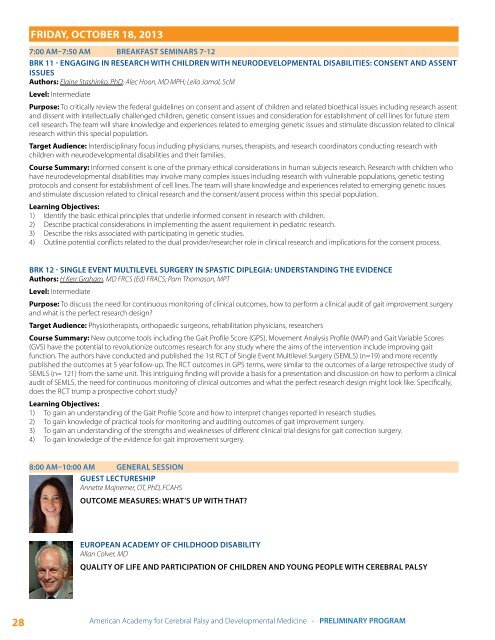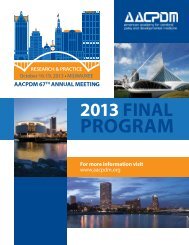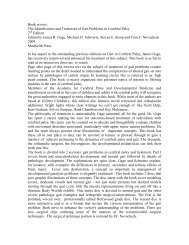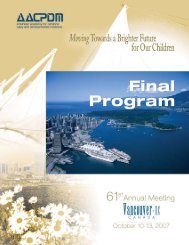program - American Academy for Cerebral Palsy and ...
program - American Academy for Cerebral Palsy and ...
program - American Academy for Cerebral Palsy and ...
You also want an ePaper? Increase the reach of your titles
YUMPU automatically turns print PDFs into web optimized ePapers that Google loves.
Friday, October 18, 2013<br />
7:00 am–7:50 am Breakfast Seminars 7-12<br />
BRK 11 - ENGAGING IN RESEARCH WITH CHILDREN WITH NEURODEVELOPMENTAL DISABILITIES: CONSENT AND ASSENT<br />
ISSUES<br />
Authors: Elaine Stashinko, PhD; Alec Hoon, MD MPH; Leila Jamal, ScM<br />
Level: Intermediate<br />
Purpose: To critically review the federal guidelines on consent <strong>and</strong> assent of children <strong>and</strong> related bioethical issues including research assent<br />
<strong>and</strong> dissent with intellectually challenged children, genetic consent issues <strong>and</strong> consideration <strong>for</strong> establishment of cell lines <strong>for</strong> future stem<br />
cell research. The team will share knowledge <strong>and</strong> experiences related to emerging genetic issues <strong>and</strong> stimulate discussion related to clinical<br />
research within this special population.<br />
Target Audience: Interdisciplinary focus including physicians, nurses, therapists, <strong>and</strong> research coordinators conducting research with<br />
children with neurodevelopmental disabilities <strong>and</strong> their families.<br />
Course Summary: In<strong>for</strong>med consent is one of the primary ethical considerations in human subjects research. Research with children who<br />
have neurodevelopmental disabilities may involve many complex issues including research with vulnerable populations, genetic testing<br />
protocols <strong>and</strong> consent <strong>for</strong> establishment of cell lines. The team will share knowledge <strong>and</strong> experiences related to emerging genetic issues<br />
<strong>and</strong> stimulate discussion related to clinical research <strong>and</strong> the consent/assent process within this special population.<br />
Learning Objectives:<br />
1) Identify the basic ethical principles that underlie in<strong>for</strong>med consent in research with children.<br />
2) Describe practical considerations in implementing the assent requirement in pediatric research.<br />
3) Describe the risks associated with participating in genetic studies.<br />
4) Outline potential conflicts related to the dual provider/researcher role in clinical research <strong>and</strong> implications <strong>for</strong> the consent process.<br />
BRK 12 - SINGLE EVENT MULTILEVEL SURGERY IN SPASTIC DIPLEGIA: UNDERSTANDING THE EVIDENCE<br />
Authors: H Kerr Graham, MD FRCS (Ed) FRACS; Pam Thomason, MPT<br />
Level: Intermediate<br />
Purpose: To discuss the need <strong>for</strong> continuous monitoring of clinical outcomes, how to per<strong>for</strong>m a clinical audit of gait improvement surgery<br />
<strong>and</strong> what is the perfect research design?<br />
Target Audience: Physiotherapists, orthopaedic surgeons, rehabilitation physicians, researchers<br />
Course Summary: New outcome tools including the Gait Profile Score (GPS), Movement Analysis Profile (MAP) <strong>and</strong> Gait Variable Scores<br />
(GVS) have the potential to revolutionize outcomes research <strong>for</strong> any study where the aims of the intervention include improving gait<br />
function. The authors have conducted <strong>and</strong> published the 1st RCT of Single Event Multilevel Surgery (SEMLS) (n=19) <strong>and</strong> more recently<br />
published the outcomes at 5 year follow-up. The RCT outcomes in GPS terms, were similar to the outcomes of a large retrospective study of<br />
SEMLS (n= 121) from the same unit. This intriguing finding will provide a basis <strong>for</strong> a presentation <strong>and</strong> discussion on how to per<strong>for</strong>m a clinical<br />
audit of SEMLS, the need <strong>for</strong> continuous monitoring of clinical outcomes <strong>and</strong> what the perfect research design might look like. Specifically,<br />
does the RCT trump a prospective cohort study?<br />
Learning Objectives:<br />
1) To gain an underst<strong>and</strong>ing of the Gait Profile Score <strong>and</strong> how to interpret changes reported in research studies.<br />
2) To gain knowledge of practical tools <strong>for</strong> monitoring <strong>and</strong> auditing outcomes of gait improvement surgery.<br />
3) To gain an underst<strong>and</strong>ing of the strengths <strong>and</strong> weaknesses of different clinical trial designs <strong>for</strong> gait correction surgery.<br />
4) To gain knowledge of the evidence <strong>for</strong> gait improvement surgery.<br />
8:00 am–10:00 am General Session<br />
Guest Lectureship<br />
Annette Majnemer, OT, PhD, FCAHS<br />
Outcome measures: What’s up with that?<br />
European <strong>Academy</strong> of Childhood Disability<br />
Allan Colver, MD<br />
Quality of life <strong>and</strong> participation of children <strong>and</strong> young people with cerebral palsy<br />
28<br />
<strong>American</strong> <strong>Academy</strong> <strong>for</strong> <strong>Cerebral</strong> <strong>Palsy</strong> <strong>and</strong> Developmental Medicine • PRELIMINARY PROGRAM







